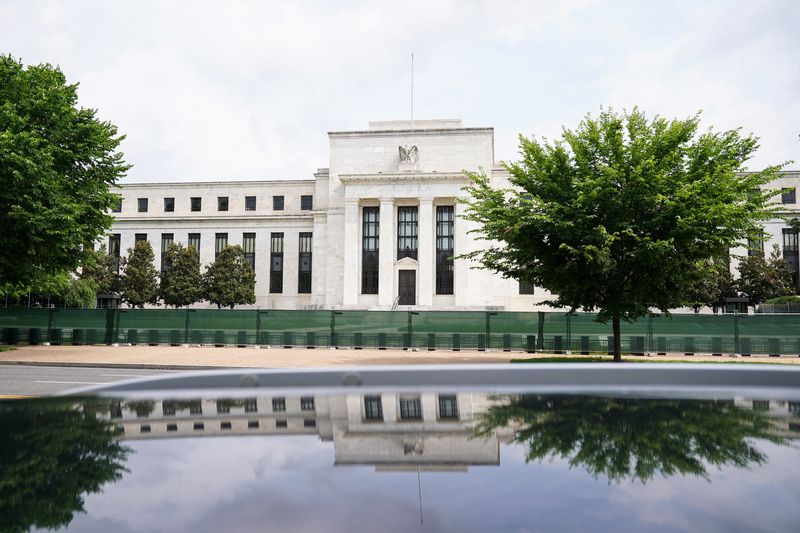LONDON (Reuters) -The Federal Reserve this week delivered its biggest interest rate rise in over a quarter of a century and even the Swiss National Bank took markets by surprise with an aggressive rate hike.
It leaves the Bank of Japan the only major developed world central bank still clinging to the inflation-is-transitory mantra.
Here's a look at where policymakers stand in the race to contain red-hot inflation.
1) UNITED STATES
The Federal Reserve vaulted to the top-hawk spot on June 15, raising the target federal funds rate by three quarters of a percentage point to a 1.5%-1.75% range.
It acted days after data showed 8.6% annual U.S. inflation, triggering a market frenzy over potentially even more aggressive responses in the coming months.
The Fed is also reducing its $9 trillion stash of assets accumulated during the pandemic.
2) NEW ZEALAND
The Reserve Bank of New Zealand raised its official cash rate by 50 basis points (bps) to 2% on May 25, a level not seen since 2016. That was its fifth straight rate hike.
It projected rates to double to 4% over the coming year and stay there until 2024. New Zealand inflation reached a three-decade high of 6.9% in the year to Q1, versus a 1-3% target.
3) CANADA
The Bank of Canada delivered a second consecutive 50 bps rate increase to 1.5% on June 1, and said it would "act more forcefully" if needed.
With April inflation at 6.8%, Governor Tiff Macklem has not ruled out a 75 bps or larger increase and says rates could go above the 2%-3% neutral range for a period.
Deputy BoC governor Paul Beaudry has warned of "galloping" inflation and markets price an unprecedented third consecutive 50 bps increase in July.
4) BRITAIN
The Bank of England (BoE) raised interest rates by 25 bps on Thursday and pledged to act "forcefully" to stamp out dangers posed by a UK inflation rate heading above 11%.
The British benchmark interest rate is now at its highest since January 2009. The BoE has now raised borrowing costs five times since December.
5) NORWAY
Norway's Norges Bank was the first big developed economy to kick off a rate-hiking cycle last year and has raised rates three times since September. It is expected to increase its 0.75% rate again on June 23 and plans seven more moves by end-2023.
6) AUSTRALIA
With the economy recovering smartly and inflation at a 20-year high of 5.1%, the Reserve Bank of Australia (RBA) raised rates by a surprise 50 bps on June 6. It was the RBA's second straight move after insisting for months policy tightening was way off.
Money markets price in another 50 bps rise in July.
7) SWEDEN
Another late-comer to the inflation battle, Sweden's Riksbank raised rates to 0.25% in April in a quarter-point move. With inflation at 6.4%, versus its 2% target, the Riksbank may now opt for bigger moves.
Having said as recently as February that rates would not rise until 2024, the Riksbank expects to hike two or three more times this year.
8) EURO ZONE
Now firmly in the hawkish camp, and facing record-high inflation, the European Central Bank (ECB) said on June 9 it would end bond-buying on July 1, hike rates by 25 bps that month for the first time since 2011 and again in September.
But without details on a tool to prevent borrowing costs for Southern European nations diverging too much above those of Germany, markets will test the ECB's resolve.
The bank now plans to accelerate work on a potential new tool to contain so-called bond market fragmentation, and skew proceeds from maturing pandemic-era bond holdings into stressed markets.
9) SWITZERLAND
On June 16, the Swiss National Bank (SNB) unexpectedly raised its -0.75% interest rate, the world's lowest, by 50 bps, sending the franc soaring.
Recent franc weakness has contributed to driving Swiss inflation towards 14-year highs and SNB governor Thomas Jordan said he no longer sees the franc as highly valued. That has opened the door to bets on more rate hikes; a 100 bps move is now priced for September.
10) JAPAN
That leaves the Bank of Japan (BoJ) as the holdout dove.
On Friday, it maintained ultra-low interest rates and vowed to defend its cap on bond yields with unlimited bond-buying. It holds 10-year yields in a 0%-0.25% range.
BoJ boss Haruhiko Kuroda stressed commitment to maintaining stimulus, warning of risks to the economy from tighter policy.
In a nod to yen weakness, Kuroda called its rapid decline to 24-year lows "undesirable" as it heightened uncertainty.
The BoJ may come under political pressure, however, given inflation may exceed the 2% target for the second straight month and elections loom in July. Hedge funds, meanwhile, are betting it can't keep up huge bond-buying for ever.
